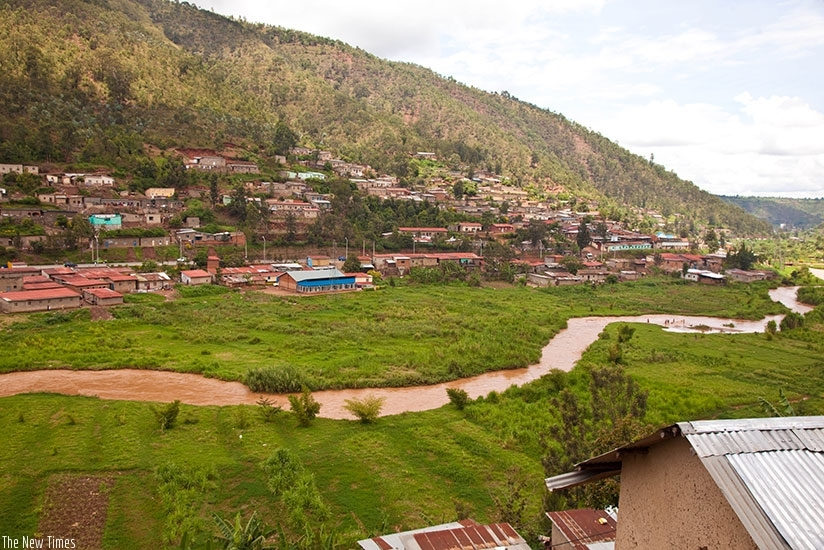Rwandans who own land in Kigali’s informal settlements will be shareholders in a scheme that will turn unplanned settlements into quality condos in accordance with the city’s master plan, an architect says.
According to Abias Philippe Mumuhire, an architect coordinating the Kigali Urban Upgrading Project, the feasibility study of the project was completed last year.
Mumuhire said: “The scheme was adopted and it was later accepted by the government as one of the strategies of upgrading informal settlements in the National Informal Settlement Upgrading Strategy which was validated and approved by the Cabinet early this year.
“As described in the scheme, a poor family owning land in informal settlement will be shareholders in the scheme and will also get a house in the newly developed neighborhood. They are at the epicenter of the project.”
In 2015, when officials first made public the notion of exploring ways to spearhead a financial scheme to enable slum dwellers to move into decent modern housing units, Fidele Ndayisaba, the then Mayor, said cities all over the world are built by real estate developers and not individual developers.
At the time, Dr Darin Gunesekera, a realtor consultant who set up the Real Estate Exchange (REEL) in Sri Lanka, and was previously a capital markets advisor in Kenya, was contracted through the World Bank to study and develop the proposal for the novel scheme. He finished his work last year.
Explaining the scheme’s methodology earlier, Dr Gunesekera said it is possible to design Social Real Estate Investment Trusts, or Social REITs, whereby poor slum residents benefit [own quality homes] based on the amount of space or land they give up or put in the trust. His idea is that a good architect can then build a larger apartment that needs much less land and is less costly to build.
Dr Gunesekera said the scheme succeeded in Sri Lanka and in the Philippines.
A concept note of the scheme, seen by Sunday Times, indicates that the Social REIT scheme may be immediately implemented as it calls for a re-arrangement of what is on the ground and does not involve government expenditure on the housing requirement nor additional legal formulations.
“Its essence is that the private sector acts as market participants implementing all aspects while the government acts as a regulator and promoter,” reads part of the concept note.
The Social REIT, it explains, is a financial asset created to facilitate the implementation of the city’s master plan. Accordingly, the scheme comes from the Capital Markets Authority and the City of Kigali, but requires that all agencies of the state with pertinent responsibilities to join in.
After being adopted, Mumuhire said, the scheme is now under review in different financial institutions, to analyze how best it can be launched.
“The pilot scheme will have to be done in some of the informal settlements closer to the city center which can be easily provided with basic infrastructure such as: water, electricity, internet and which also is valuable land because of its strategic location. For example, in some parts of Muhima or of Gitega.”
Step in the right direction
Josephine Malonza, a lecturer at the University of Rwanda’s School of Architecture and the Built Environment, told Sunday Times that “by beginning to embrace informal settlements, by considering upgrading them, the city has already made one big step in the right direction” in ensuring projects like these are not hijacked by the rich.
Malonza said: “To me, this means that the city is considerate of the housing conditions and quality of life for what we call the urban poor. By housing conditions I mean the types and physical conditions of the dwellings, the house tenure as well as the surrounding environment and availability of basic amenities.
“By quality of life, I mean the health, safety and social support to be enjoyed by these citizens. When these two parameters take shape every urban citizen, rich or poor, enjoys being part and parcel of the city without threats from each other.”
According to Malonza, the issue of informal settlements is a challenge that every city world over experiences and it is a serious issue that is too complex to be easily tackled.
“It involves multi-layers issues and stakeholders who all play a key role in either the problem or the solution or both. In developing counties, the proportion of people living in informal settlements is on the rise due to rapid population growth and poverty.”
Malonza who is an architect and urban designer with keen interest in the dialectical relations between architecture and society observes that, among other things, what works in Kigali may not necessarily work in Kampala or Nairobi, and vice versa.
“What needs to be done is a critical examination of all possibilities in order to clearly find out which ones work best for each context.”
